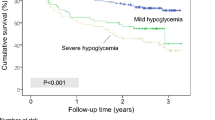Abstract
Purpose
The purposes of this study are to identify the cumulative incidence of post-bariatric surgery hypoglycemia (PBSH), describe its symptomatology, and characterize treatment patterns at a large academic institution.
Materials and Methods
All patients who underwent bariatric surgery at a single institution from 1985 to 2015 were identified using a clinical database, administrative billing data identified patients who were treated for hypoglycemia, and chart reviews were performed to make a diagnosis of PBSH based on Whipple’s triad. PBSH cases were reviewed including patient diabetes history, symptomatology, and treatment measures. Univariate analyses were performed to identify correlations based on symptomatology, laboratory values, and treatments utilized.
Results
Ninety (2.6%) of 3487 patients were diagnosed with PBSH with preoperative median age of 43 years, mean BMI of 50.0 kg/m2, and median glycated hemoglobin of 6.0%. Median time-to-first hypoglycemic event was 40.6 months. No factors were identified which predict symptom severity or resolution. The 24 (27%) patients who received pharmacotherapy to treat hypoglycemia were younger, had lower nadir blood glucose levels, and more frequent symptoms. Sixty-nine (79%) cases eventually resolved.
Conclusions
PBSH onset and severity are highly variable. Successful management of these patients can prove difficult and should include dietary therapy, the selective use of pharmacotherapy and surgery, and the use of a multidisciplinary team including bariatric surgeons and endocrinologists.
Similar content being viewed by others
References
Flegal KM, Kruszon-Moran D, Carroll MD, et al. Trends in obesity among adults in the United States, 2005 to 2014. JAMA. 2016;315(21):2284–91.
American Society for Metabolic and Bariatric Surgery. Estimate of bariatric surgery numbers, 2011–2015. 2016 [cited 2017 March 7]; Available from: https://asmbs.org/resources/estimate-of-bariatric-surgery-numbers.
Gloy VL, Briel M, Bhatt DL, et al. Bariatric surgery versus non-surgical treatment for obesity: a systematic review and meta-analysis of randomised controlled trials. BMJ. 2013;347:f5934.
Mehaffey JH, LaPar DJ, Clement KC, et al. 10-year outcomes after Roux-en-Y gastric bypass. Ann Surg. 2016 Jul;264(1):121–6.
Pories WJ, Mehaffey JH, Staton KM. The surgical treatment of type two diabetes mellitus. Surg Clin North Am. 2011;91(4):821–36. viii
Sjostrom L, Peltonen M, Jacobson P, et al. Bariatric surgery and long-term cardiovascular events. JAMA. 2012;307(1):56–65.
Ribeiro-Parenti L, Arapis K, Chosidow D, et al. Comparison of marginal ulcer rates between antecolic and retrocolic laparoscopic Roux-en-Y gastric bypass. Obes Surg. 2015;25(2):215–21.
Podnos YD, Jimenez JC, Wilson SE, et al. Complications after laparoscopic gastric bypass: a review of 3464 cases. Arch Surg. 2003;138(9):957–61.
Higa KD, Ho T, Boone KB. Internal hernias after laparoscopic Roux-en-Y gastric bypass: incidence, treatment and prevention. Obes Surg. 2003;13(3):350–4.
Ukleja A. Dumping syndrome: pathophysiology and treatment. Nutr Clin Pract. 2005;20(5):517–25.
Service GJ, Thompson GB, Service FJ, et al. Hyperinsulinemic hypoglycemia with nesidioblastosis after gastric-bypass surgery. N Engl J Med. 2005;353(3):249–54.
Marsk R, Jonas E, Rasmussen F, et al. Nationwide cohort study of post-gastric bypass hypoglycaemia including 5,040 patients undergoing surgery for obesity in 1986-2006 in Sweden. Diabetologia. 2010;53(11):2307–11.
Lee CJ, Clark JM, Schweitzer M, et al. Prevalence of and risk factors for hypoglycemic symptoms after gastric bypass and sleeve gastrectomy. Obesity (Silver Spring). 2015;23(5):1079–84.
Abrahamsson N, Borjesson JL, Sundbom M, et al. Gastric bypass reduces symptoms and hormonal responses in hypoglycemia. Diabetes. 2016;65(9):2667–75.
Nannipieri M, Belligoli A, Guarino D, et al. Risk factors for spontaneously self-reported postprandial hypoglycemia after bariatric surgery. J Clin Endocrinol Metab. 2016;101(10):3600–7.
Lee CJ, Wood GC, Lazo M, et al. Risk of post-gastric bypass surgery hypoglycemia in nondiabetic individuals: a single center experience. Obesity (Silver Spring). 2016;24(6):1342–8.
Laurenius A, Werling M, Le Roux CW, et al. More symptoms but similar blood glucose curve after oral carbohydrate provocation in patients with a history of hypoglycemia-like symptoms compared to asymptomatic patients after Roux-en-Y gastric bypass. Surg Obes Relat Dis. 2014;10(6):1047–54.
Rariy CM, Rometo D, Korytkowski M. Post-gastric bypass hypoglycemia. Curr Diab Rep. 2016;16(2):19.
Mala T. Postprandial hyperinsulinemic hypoglycemia after gastric bypass surgical treatment. Surg Obes Relat Dis. 2014;10(6):1220–5.
Author information
Authors and Affiliations
Corresponding author
Ethics declarations
Grant Funding
Research reported in this publication was supported by the National Institutes of Health under award numbers T32AI0074 (ADM) and T32HL07849 (JHM).
Conflict of Interest
Dr. Michaels reports grants from the National Institutes of Health during the conduct of the study. Dr. Mehaffey reports grants from the National Institutes of Health during the conduct of the study. Dr. French, Dr. Schirmer, Dr. Kirby, and Dr. Hallowell declare that they have no conflict of interest.
Ethical Statement
All procedures performed in studies involving human participants were in accordance with the ethical standards of the institutional and/or national research committee and with the 1964 Helsinki declaration and its later amendments or comparable ethical standards.
Consent Statement
For this type of study, formal consent is not required.
Rights and permissions
About this article
Cite this article
Michaels, A.D., Hunter Mehaffey, J., Brenton French, W. et al. Hypoglycemia Following Bariatric Surgery: Our 31-Year Experience. OBES SURG 27, 3118–3123 (2017). https://doi.org/10.1007/s11695-017-2734-2
Published:
Issue Date:
DOI: https://doi.org/10.1007/s11695-017-2734-2




